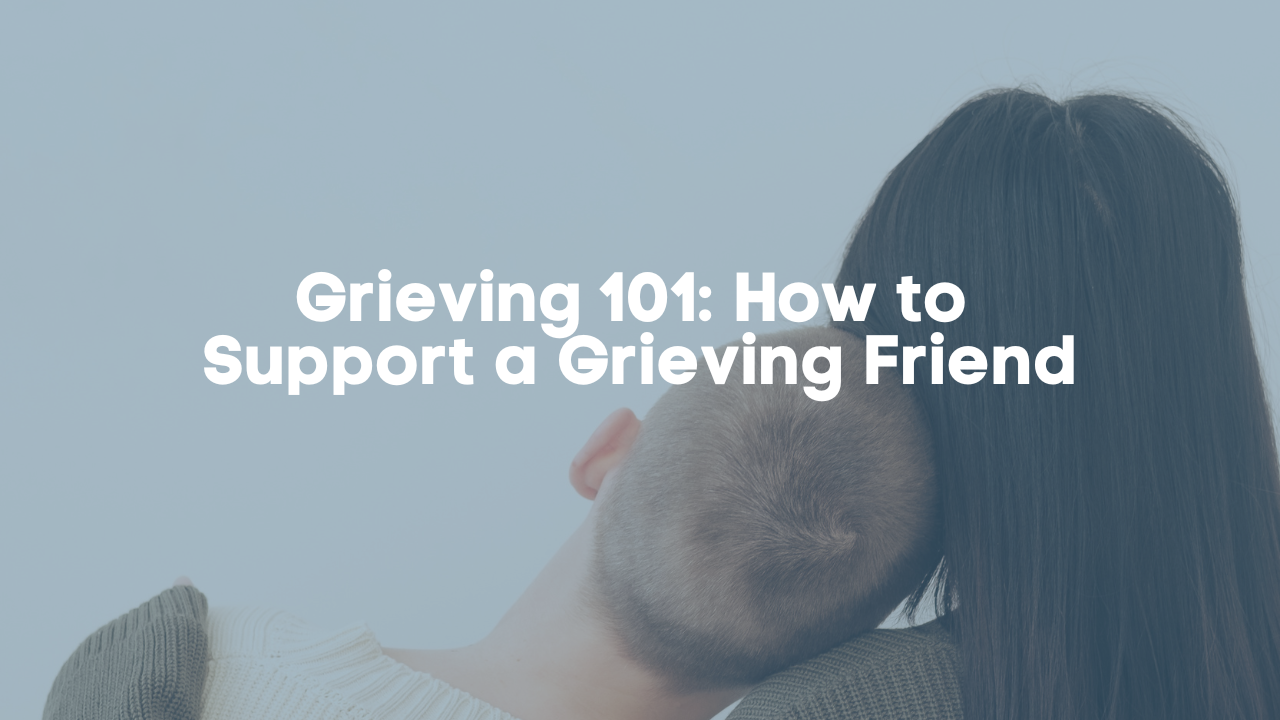Grieving 101: How to Support a Grieving Friend
May 25, 2025
Your friend is grieving, and you want to help. Maybe they've lost someone to death. Maybe they're going through a divorce. Maybe they're facing a serious diagnosis or job loss. Whatever the loss, you're wondering what to say, what to do, and how to show up in the way they need right now.
There's no perfect script for supporting someone through grief. It isn't about saying the exact right words or making the pain go away. It's about showing up, staying present, and creating space for whatever they're feeling.
What Usually Helps:
Just show up.
Text, call, drop by (with advance notice). Don't wait for them to reach out – they probably won't have the energy. A simple "Thinking of you today" can mean everything. Sometimes that random Tuesday text three months after the loss is more needed than right after it happened.
Offer specific help instead of vague support.
Try: "I'd like to bring you dinner this week. Is 6pm on Thursday okay?" or "I'm free Saturday morning to mow your lawn or run errands with you. Can I stop be then?" Your grieving friend may not have the mental space to articulate what they need (decision-making can go out the window when grief hits), so getting specific makes it easier for them to say yes.
Follow their lead on talking about their loss.
Some days they might want to share memories or vent. On other days, they might need a distraction. Both are valid, and neither means they're "doing grief wrong." Some people need to talk about what they're grieving constantly, others can't bear to discuss it at all. (And sometimes, the same person feels both ways within the same day.)
Remember that grief doesn't follow a timeline.
Your friend might seem fine one month and then fall apart six months later. Grief comes in waves, and those waves can hit unexpectedly – especially around holidays, anniversaries, or birthdays. (Year two is often harder than year one, which surprises a lot of people.) So, that means you get to continue supporting your friend long after the loss. Set a reminder for yourself months later to check back in as one way to stay connected to your grieving friend.
Listen without trying to fix.
Resist the urge to offer solutions or silver linings. Sometimes the most supportive thing is just sitting in the hard stuff together and saying, "This really sucks, and I'm here with you."
Keep checking in, even when everyone else has moved on.
The casseroles stop coming, the sympathy cards end, but your friend is still grieving. Be the one who remembers.
Validate whatever they're feeling.
There's no wrong way to grieve. Angry, sad, numb, relieved, guilty, or even occasionally finding moments of joy – it's all normal.
What Might Not Be As Helpful:
When we're uncomfortable with someone's grief, we often say things to make ourselves feel better, not them. Even with the best intentions, certain phrases can miss the mark:
"I know exactly how you feel"
Each grief journey is deeply personal, even if you've experienced something similar.
Instead try: "I can only imagine how you're feeling."
"Everything happens for a reason"
This philosophical platitude might bring you comfort but can feel hollow to someone in the depths of grief.
Instead try: "This really sucks, and I'm here."
"They're in a better place" or "At least they're not suffering anymore" -
Maybe, but your friend still wishes they were here.
Instead try: "I miss them too."
"At least you had them for X years"
There's no "at least" in grief. No amount of time feels like enough.
Instead try: "I'm so sorry for your loss."
"You need to stay strong"
Sometimes falling apart is exactly what they need to do.
Instead try: "However you're feeling is okay."
"It's been X months/years, you should be feeling better by now"
Grief doesn't follow a timeline.
Instead try: "Grief takes as long as it takes. I'm still here."
"I know what will cheer you up!"
Grief isn't something to be fixed or cheered up from.
Instead try: "Would you like some company today? It's okay to say no."
What to Say When You Don't Know What to Say:
"I'm so sorry this is happening."
"I don't know the right words, but I'm here."
"This really sucks." "I'm thinking about you."
"How does today feel?" (and being prepared for an honest answer)
Supporting Different Types of Grief:
Different losses might need different approaches— but remember that it’s all grief.
For a friend going through divorce, create space for them to process complex emotions about their ex without judgment.
For someone with a new diagnosis, respect their privacy about medical details and let them guide how much they want to share.
For a friend who's lost a job, first acknowledge the loss of identity and purpose before jumping to practical solutions.
Remember that your grieving friend is still the same person, even if they seem different right now. They still need connection, still need to laugh sometimes, still need to feel like a normal human being in between the waves of grief.
And perhaps most importantly: no one needs to be perfect at this. Supporting a grieving friend isn't about having all the right answers. It's about showing up imperfectly, again and again, for as long as they need you. (Some of the best support comes from friends who simply say "I have no idea what to say, but I'm here" – and then actually stay.)
Because grief isn't something to "get over." It's something we learn to carry. And good friends make that load a little lighter, just by walking alongside us while we figure out how to hold it.
Join the Grieve Leave movement
Share your info to join our Grieve Leave community. You don’t want to miss anything!


